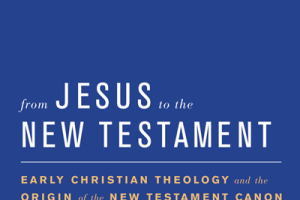I wrote this blog a little while back when I was going through seminary. The divide gets even greater at the PhD level where one is pushed to specialize even further into a certain niche topic within their chosen half of the Bible. I’d love to hear other people’s experience. Enjoy!
In my study toward my thesis I ran into an interesting article by Marvin Tate called “Promising Paths Toward Biblical Theology.”.” RevExp 78 (1981): 169-85. In it he highlights the divide between OT and NT scholarship with hopes that things are heading towards a more integrated (or at the very least a more cooperative) study of the Bible. Sadly, in my opinion, not much has changed in the field of Biblical Studies. Thanks to pioneers like N. T. Wright, the field is now opening up to actual conversation about what true Biblical Theology entails. Yet, we are still a long way from viewing theology from a Biblical lens, one that truly recognizes that God’s purpose in His progressive revelation has to be seen across the Testaments. The OT is just as important as the NT because it lays the foundation for God’s methodology as He relates to humans. This methodology is grace, not just specific dispensations of grace but an overarching theme of grace.
“The departmentalization of biblical studies in colleges, universities, and seminaries has fostered a situation in which biblical study is done quite unbiblically, since neither the Old Testament nor the New Testament composes the Bible of the Christian church.”
This is especially true where I attend seminary, although it is subtle in its definition of what the departments encompass. We have a NT, an OT and a Biblical Exposition department. Each are harbingers of separate degrees. We also have a Theology department which has its own niche areas (ie. Systematic and Historical Theology). There are also a few degrees programs that are jokingly called “create you own adventure” degrees. These degree plans have the basic core classes (OT and NT Survey, Historical Theology, Systematic Theology, etc.), yet the student is free to mix and match different elements from different departments (with the guidance of a Faculty advisor). This seems to be the only way a student could gain a degree that focuses on Biblical Theology. Sadly, even then the student would have to sit through NT and OT classes, navigate through the dogmatic structure of the series of Systematic courses, explore niche seminars on different OT and NT topics, and then step back from it all and look at what they have learned while attempting to integrate all of it from a Biblical perspective. Seminary doesn’t train you to do this. It trains you to compartmentalize what you learn.
Tate thinks that the reformers started off as Biblical theologians yet their progeny did not hold the same values. “Dogma increasingly shackled biblical study, and biblical theology became the willing handmaiden (concubine would be the better word) of elaborate confessions of faith and the footnotes of weighty tomes of systematic theology, whose authors were sure that they could not only think the thoughts of God, but could express them in satisfactory Latin as well. Biblical theology degenerated into a ‘kept’ exegesis of proof-texts designed to support the various articles or sections of the confessions of faith and the erudite arguments of the learned theologians.”
For me this became completely evident as I sat through a Systematic Theology class and listened to the instructor, a very reformed individual, bring to bare several OT proof texts of NT concepts that disregarded any form of hermeneutical approach. At first glance some of these texts seemed to do nothing but strengthen that theological concept given, yet as I thumbed back into the OT and explored the context of some of these proof texts I was confused. The surrounding scriptures seemed to be speaking of something completely different. I asked this question in class and was dismayed at the answer. The instructor was nonplussed. Why would it not be OK to rape and pillage OT texts to prove a NT point? Don’t we find the same thing happening in the inspired writings of the NT? As I pressed the issue, asking about hermenutical methodology and its application in regard to systematic theology, I was referred to the church fathers and councils and the dogma they had created. Needless to say I stemmed the tide of my questions as I shakingly stood in the theological presence of such great men, ….. or maybe I stopped asking questions because I realized the fruitlessness of such a discussion. The later is was probably the case. It seemed as if I was operating from a different paradigm. A paradigm that desired that the OT make sense in and of itself. Then, in recognition of such “inspiration” I would look to the NT to continue making sense in continuity with its predecessor. I believe that this is Biblical Theology.
Tate likens the split between OT and NT to an estate with two houses. “The manor house was the New Testament but the old house (Old Testament), which had been used while the new house was built, was kept, at least as a tourist attraction (with particular attention to the prophets).” I reached maturity in the manor house but still remember fondly those narrative attractions as we visited the old house in Sunday School. Surprisingly, as I revisited the old house in my youth I found that I had been strangely naive about the quality of the OT’s contents. While Sunday School teachers had made the OT stories bright and exciting, when read on their own, I found them to be dark and confusing. Not to mention the long sections of legal code that had absolutely nothing to do with my normal everyday life.
So, I was content to stay in the new house, live there, grow up and become an “expert” there. I was content with occasional visits to the OT to keep up my “biblical knowledge” and I even made a point to memorize sections of the prophetic texts that proved Jesus was the long awaited Messiah. I was warned at one point that if I spent to much time in the OT that I would become legalistic. It was good to read the OT but I would need to counterbalance its drying effect on my spiritual life with fresh NT readings daily.
All of this changed when I got to seminary and was challenged by a few professors to look at the OT in the light of grace. Strangely, this challenge came from OT professors….





3 Comments
Leave your reply.